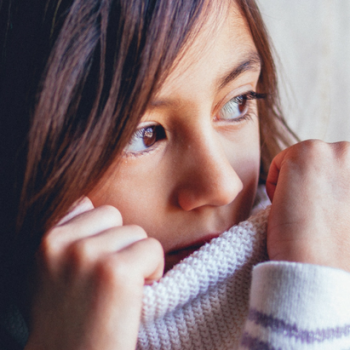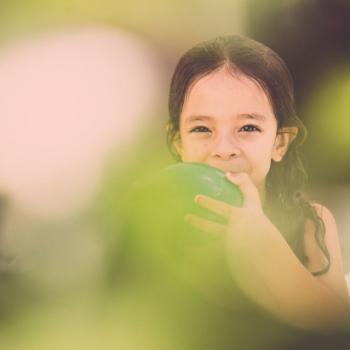Who, if your child asks for bread, would give him a stone?
As parents, we are responsible for feeding our children. We are responsible for feeding their bellies and feeding their spirits and feeding their need for affection and security and love. As parents who are also people of faith, we are responsible for feeding them beliefs they can live by, a faith they can walk by, a love they can dwell in.
The spiritual teachings we give our children are ones they will carry for a long time. So it’s worth asking: are we giving them bread, or stones?
From a psychological perspective, experts have said for years that the idea of inherent human badness- what we call in Christian parlance a sin nature- is unhealthy and unhelpful. It creates shame and guilt and can often become a self-fulfilling prophecy. Ironically enough, belief in a sin nature begets sinning.
For fifteen hundred years, the Western Christian church has decided a sin nature is our cross to bear, regardless of psychological evidence to the contrary, because we have falsely believed the Bible tells us so.
But we forget the One who utters these profoundly simple words to us. What parent, Jesus asks, would give a child a stone when she asks for bread? He says it like it’s such an obviously rhetorical question. When we come to God our Parent with our need, God responds not with stones but with bread, and the Bread of Life at that.
That doesn’t sound like a God who destines us to a sin nature and condemns us all for a fall.

We are designed to be anchored in God’s love, nestled down in the wings of God’s steadfast goodness. What we need, before anything else, is to know we are loved, just as we are, just because. We are not born with a sinful nature, but a human nature designed for blessing and abundant life, because we are made in the image of a God of blessing and abundant life. That doesn’t mean we don’t live in a world of sin, or even that a world of sin doesn’t reside sometimes in our own hearts and minds. But no sin can uproot the blessing that resides at the center of our being.
We parents of faith are admittedly pretty good about telling our young children God loves them. But when the teen years come around, or when a parenting crisis strikes at any age, we can lose our resolve and start relying on a story far more centered on sin nature instead. Once our children know they have the choice to eat the fruit, all that talk about God’s unconditional love can get upstaged by our own parental anxiety.
Which is why it’s important to remember the words of Jesus. Do we want to give our children stones or bread? Which story of God do we most believe to be true? A story of original sin, or a story of original blessing? And if we can look at our newborn child and confess and profess that he is a child of God made in the image of God unconditionally loved by God, do we really think that ever stops being true?
Do we think that ever stopped being true for us?
When we examine our own spiritual belief backpacks, many of us find we’ve been carrying the heavy stones of original sin, and a mountain of guilt and shame pebbles that pile up day after day, year after year. It is a heavy burden, and an unnecessary one. And it may be a burden we are condemning our children to carry, too, if we aren’t mindful. But Jesus reminds us that his yoke is easy and his burden is light. Blessing doesn’t weigh us down; it frees us and makes us light of heart. Blessing doesn’t bear down on our shoulders. It fills our belly with good things.
What would it look like for us to drop the story of original sin? Just drop it, like a sack of stones, abandoned by the wayside. What if we stopped to realize the story of God has never told the story of original sin in the first place? What if we recognized that the story scripture has been trying to tell us, page after page after page, is that the basis of our nature is not sin but God’s unwavering love for us?
What if our children were told this so often and so persistently and so passionately that they were able to move through both feats and failures with an anchoring in the One who made them?
Can you imagine what the world could be like if it were filled with people anchored in God’s blessing?
When we read scripture through the lens of blessing, through trust in the One who chooses to give us bread and not stones, we find that the story of blessing has been waiting there for us all along. And that story has the power to change the way we see God, the way we see ourselves, the way we understand sin and salvation and Jesus and our own human foibles. It has the power to transform, like every other story God tells us. The story of blessing is the feast of God for the people of God.
It’s time we stopped gnawing on stones.
 Danielle Shroyer is the author of the forthcoming Original Blessing: Putting Sin in its Rightful Place (Fortress 2016), as well as Where Jesus Prayed: Illuminations on the Lord’s Prayer in the Holy Land (Paraclete 2015) and The Boundary-Breaking God: An Unfolding Story of Hope and Promise (Jossey-Bass 2009). She served as a pastor for ten years before turning to writing full-time. Danielle writes and speaks often on matters of faith, culture and theology. You can find her at www.danielleshroyer.com.
Danielle Shroyer is the author of the forthcoming Original Blessing: Putting Sin in its Rightful Place (Fortress 2016), as well as Where Jesus Prayed: Illuminations on the Lord’s Prayer in the Holy Land (Paraclete 2015) and The Boundary-Breaking God: An Unfolding Story of Hope and Promise (Jossey-Bass 2009). She served as a pastor for ten years before turning to writing full-time. Danielle writes and speaks often on matters of faith, culture and theology. You can find her at www.danielleshroyer.com.












